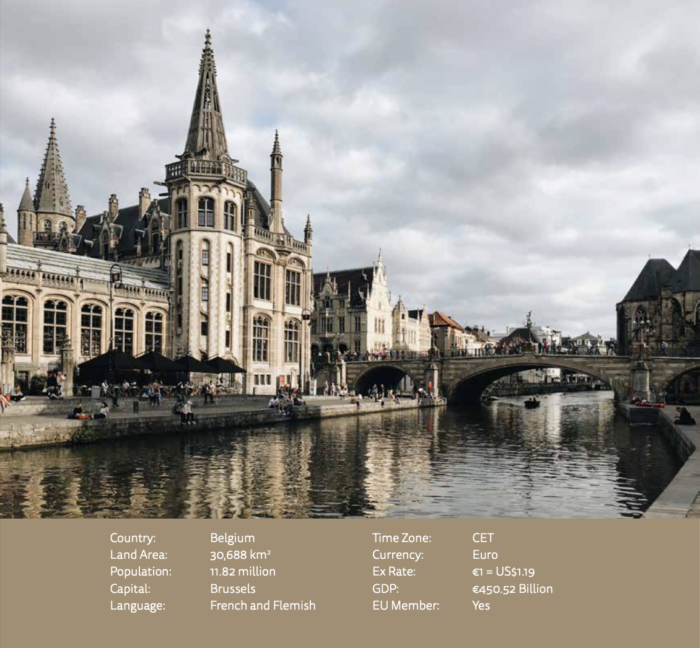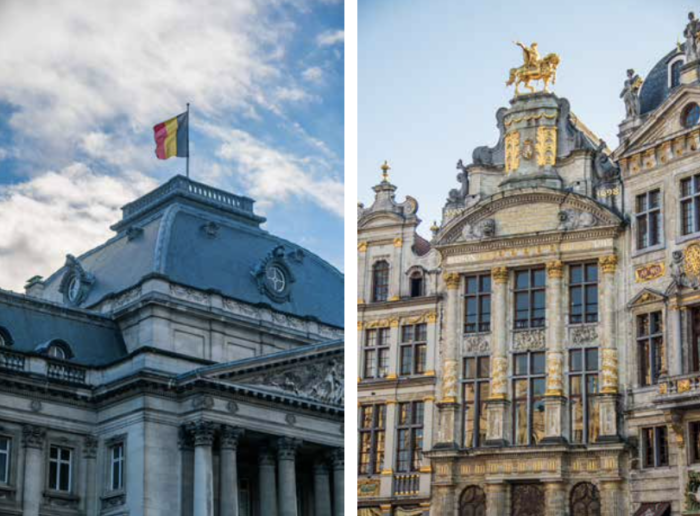Belgium was originally part of Gaul and like the rest of Europe was conquered and occupied by the Romans. During the late Middle Ages, Flanders’ trading towns (notably Ghent, Bruges and Ypres) exported woollen goods, making the area one of the richest and most urbanised parts of Europe. As a consequence, a very sophisticated culture developed, with impressive achievements in the arts and architecture, rivalling those of Northern Italy. Ghent, Bruges, Ypres and the Franc of Bruges formed the Four Members, a form of parliament which exercised considerable power in Flanders. In 1830, Belgium gained independence from the Netherlands but came under German occupation in 1914 and again between 1940 and 1944 until Belgium was liberated by the Allied forces.
Since the war, the country has prospered as a modern, technologically advanced state. On top of this, it is a member of both NATO and the EU and its capital, Brussels is considered to be the de facto capital of the European Union.
Principal Industries in Belgium
Belgium has relatively few natural resources and as such, relies on industries including refining, textiles, chemicals and steel.
Other Important Industries
Even Belgium’s secondary industries are substantial and include sectors such as pharmaceuticals, food processing, electronics, machinery fabrication and automobiles among others. The service sector accounts for about 74.9% of the country’s GDP and agriculture contributes approximately 1% to the GDP.
Doing Business in Belgium
Belgium’s economy is among the most advanced in Europe because the country has taken advantage of its geographical location in the continent and has developed a highly sophisticated transport network with a diversified commercial and industrial base. Belgium underwent the first industrial revolution in Europe in the 19th century and has developed a transportation infrastructure which makes it easy to integrate its industries with those of its neighbours. Most of the industries in Belgium are located in the most populous regions in the northern part of the country, particularly in Flanders and around the city of Brussels.
Belgium imports most of its semi-finished and raw material goods which are processed and exported as finished goods to different countries around the world.
The View from the Ground
When describing a country and its culture, you can write down all the facts and figures you like but if you want the full story, you need to get the perspective of someone with a lived experience of being there. That’s why we’ve asked Arthur to give us his take on what it’s like to live and work in Belgium.
Dutch people are very straightforward and matter of fact which is something that will definitely not work in Belgium. In my experience in sales as well as in general, I’ve generated the most business through good relationships. The way to nurture relationships in Belgium is you go for a coffee, then a second coffee, followed by lunch and then you make the deal. So, to do business in Belgium, it’s important to have a good relationship with whoever you’re trying to work with. This is one thing that is beginning to change a little bit now with the newer generation who are more hardnosed sales guys but still, if you want to have a long-term arrangement, then developing the business relationship is crucial. The second thing is that Belgians get along with a lot of different nationalities. We can do business across borders and one of the advantages we have, and perhaps a reason we’re able to do this, is that we are born speaking two languages. Of course, by the end of school, you could be speaking three or more languages. Then there’s university, where you tend to end up in a multi-cultural environment too which is why we’re able to get on with everyone.
When I started working in Holland, for example or when I was in Germany, I started first by building relationships with my clients and very quickly, they started to trust me. So, my experience with Belgians doing business internationally has been very positive. It may sound obvious, but you need to understand your client, you need to understand their needs, you need to understand everything about their business. Through that understanding, you build up a relationship with them and then you can make a deal. This depends on the type of deal you want of course, if you just want to hit and run, you can put an advertisement in the paper, but this won’t help you secure a more profitable, longer deal.
In fact, to illustrate how well the relationship model works, I would be having dinner with clients two or three times a week and I’ve even done city trips with clients just to develop a bond with them. This increased my business and my sales because I had a lot of personal contact with my clients. Even now, I’m still in touch with clients who I haven’t worked with for four or five years. And, over time, they’ve turned into real friends. What’s more, because of the bond we have created, I am the first name that comes to mind if they ever need to refer anyone. For example, when they see on LinkedIn that I have made a jump in my career or something they’ll get in touch to congratulate me and ask me what I’m doing. I actually have an example of a client from Bridgestone who did this. So, I explained my new position and he said he had some interesting things for me. There I was getting business from someone I haven’t worked with for years just because I had kept in touch.
In Belgium, we have Flemish and French speaking Belgians and there is a bit of a clash there. Obviously, on an international scale, I just see myself as Belgian but if your concentration is inside Belgium then, we have a lot of friction between North and South. The German bit is largely ignored by the other two parts, and Brussels is in the centre where we pay a lot in taxes but never get any benefits. In the end, we have 4 governments, 1 for the Flemish part, 1 for the French part, 1 for the German part and 1 for Brussels. So, everyone complains about the taxes that we need to pay for all these governments and all these ministers and everything. The political games and fighting between the parties are also a distraction and have been going on for 30 years or more. Every now and then a party will have a motion to split the country in two, but it never happens and apart from the extremists, I think most people are just bored of it now.
This friction impacts on business too because doing business between the North and the South can be a struggle. The reason it’s so difficult is because the Northern part sees the Southern part as poor and full of criminals and the South sees the North as arrogant.
I got lucky with not having to do much business between the North and the South. My area of business was the Flemish region and the South of Holland. Honestly, Flemish people don’t do a lot of business in the South part and vice versa. Then of course you have Brussels, which is the main centre with a lot of multinational companies, and that’s probably why it is seen as the place where most people look for work.
For me though, when I started to climb the career ladder, I moved to Spain because I saw more opportunities and did not think it would be possible to work in Belgium. For example, if you want to build only in Belgium, it’s not as easy as it was 20 years ago. You’ll need a lot of money to start and there are lots of rules and regulations that you’ll have to follow too. That’s not to say that companies don’t succeed of course. In fact, there are a lot of interesting start-ups coming out of Belgium right now. In recent years, there have been new ways to attract seed investors and I think that has helped a lot. On top of this of course, Brussels is still an international city with a lot of talent coming through.
As for the hierarchy system in Belgium, it is, and it isn’t a thing. I think it depends on what business you’re in. From my experience as an account manager, I’ve met company owners who were in their 50s and 60s where I felt their view was very much, “what are you doing here?” whereas in other companies, I was respected. I think it depends on the company and the person you’re trying to meet. It also depends on what level of management you’re trying to meet. I would say you may get less time with the C level management, but you will at least get the chance to prove yourself. I think this is part of the new culture we have. And now, because technology is moving faster and faster, you can have a million-euro company within a year which would not have been possible 20 years ago.
Like the British and the Americans, Belgium and the Netherlands are divided by a common language. There are some words that are perfectly normal for Belgians but strange for the Dutch. In fact, there are some words that are considered very bad in Belgium that can be mentioned in polite company in the Netherlands, so I don’t know what that’s about.
Something else that’s funny is I was working in Amsterdam for a Dutch sales company, a hard sales company and we had to come in on a Monday and a Friday to do the cold calls and the other days were for the meetings. So, on one of my first days, I’d received an email saying that on Monday, everyone had to come to the office in a dress. I just assumed this was a joke on the new guy, but when I arrived everyone was making their calls and it was business as usual apart from the fact that everyone was wearing a dress. Nothing like this had ever happened to me before. It’s one of the more surreal moments of my career. After I started joining in with these things though, I think it made me more assertive, so I learned a lot in my time there.
There were some intimidating things used by management as motivation though. There was a big whiteboard in the office with your name and the number of appointments you’d made listed on it. The goal was to get one meeting an hour and if you didn’t do that, you had to do an “open call,” that everyone on the floor could hear. Thankfully these tactics aren’t used any more, well, not here anyway but I believe it’s still practised in the USA.
Business Etiquette
During meetings, it is typical to engage in small talk before getting down to business and remember that you should wait for your Belgian counterpart to initiate the business discussion.
Belgians like a direct, logical communication style, and have a flexible approach to forging win-win deals. You should avoid any confrontational or high-pressure tactic. It is important to maintain eye contact with your prospect, as it is a sign of courtesy and interest.
Food is important and if conducting business over a meal, it is better not to try to discuss the details of a business transaction until coffee is served at the end of the meal. The person who extends the invitation will pay the bill.





